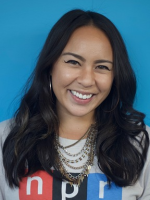MICHEL MARTIN, HOST:
Prices inching ever higher, that ever-growing holiday gift list - there are a lot of reasons to want to stretch your dollars these days. If you have good credit, collecting credit card points and rewards can be a great way to subsidize your spending and even get some freebies. Life Kit's Andee Tagle has a beginner's guide to making the most of credit card points.
ANDEE TAGLE, BYLINE: The process of spending money with your credit card in order to earn rewards like cash back or hotel stays might feel out of reach for some, like a luxury reserved only for people with both funds and time to spare. But personal finance and travel journalist Katherine Fan says not so, and she speaks from personal experience.
KATHERINE FAN: I made $28,000 a year in my very first full-time job, so, you know, no extra cash there for a $1,500, $2,000 flight home.
TAGLE: To get to her family in Taiwan at the time, Fan opened credit cards with travel benefits. In time, she was able to fly home and back on miles alone. Over the years, Fan has flown thousands of miles for free, many times in an upgraded seat. And after years of covering credit cards for outlets like The Points Guy and Nerdwallet, Fan's takeaway is...
FAN: It's not limited to super-rich people. It's not limited to people who travel a lot for work. It's definitely not limited to, you know, young professionals who are single and don't have kids. Anyone can get into this.
TAGLE: But note her use of the word can here, not should or must, because there are barriers to entry. To start, you'll have to have at least good credit to access credit cards with good perks. Fan suggests a minimum of 650 or 720 if you're interested in some premium cards. Those are the ones that will score you things like first-class plane seats or luxury hotel stays, but will often come with a high annual fee. Another absolute must?
FAN: Pay off your balances in full. And if you happen to struggle at all with the temptation of treating a credit card like free money, then really don't get into it.
TAGLE: If you can meet those criteria, there is a lot to be gained. There are a lot of travel benefits to be had with points, of course. But even if you don't plan on doing any jet setting...
FAN: Credit card points are valuable because they are untaxed. So if you spend $1,000 and you earn 3% cash back on every bit of that, you get $33 that you don't have to pay tax on. I always think that's a pretty solid deal compared to 0%.
TAGLE: The trick to getting the most bang for your buck is to make sure you choose a car that fits your unique needs and spending habits. Fan carries cards as much for the perks as for the protection. For example, she carries one card that offers cellphone coverage.
FAN: They'll repair or replace it for me for up to 600 or $800.
TAGLE: Another that has good travel insurance like protection if her bags are lost or stolen.
FAN: So that's a benefit I definitely want to keep.
TAGLE: And then there's a card for the usual gas and groceries. Does Fan have recommendations for specific cards? Yeah, she's got lots of them. She mentioned the Bilt card from Wells Fargo for earning points on rent. And the Chase Sapphire Preferred card...
FAN: Has one of the absolute best rental car insurance policies, hands down.
TAGLE: But she stressed credit cards and points are only worth investing in if you can actually work them into your life and find ways to offset the cost of entry. So do your research and decide what you need before signing up for anything. Does this card have an annual fee that kicks in after the first year? There are plenty that don't. What's the monthly interest rate? Twenty thousand sign-up bonus points sounds like a lot, but how far will they actually get you? Find your fit. And then, if you're nervous, just test the waters with one card. You should still see the benefits.
FAN: You know, maybe get a cash back credit card for everyday groceries, gas. Make sure it's in your wallet. Make sure it's signed up for autopay on your utilities. Even just by doing that, you'll probably end up with a few hundred dollars, a couple of thousand dollars in your bank account at the end of the year.
TAGLE: For NPR's Life Kit, I'm Andee Tagle. Transcript provided by NPR, Copyright NPR.
NPR transcripts are created on a rush deadline by an NPR contractor. This text may not be in its final form and may be updated or revised in the future. Accuracy and availability may vary. The authoritative record of NPR’s programming is the audio record.



